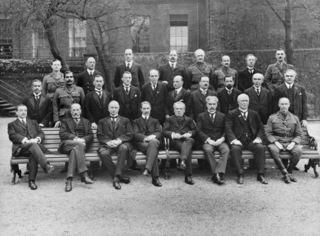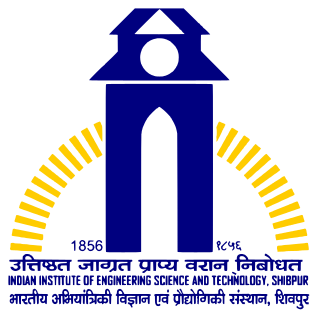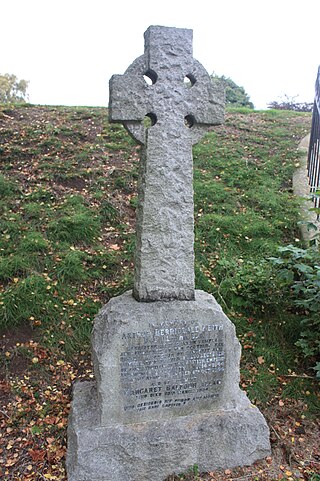Related Research Articles

The Imperial War Cabinet (IWC) was the British Empire's wartime coordinating body. It met over three sessions, the first from 20 March to 2 May 1917, the second from 11 June to late July 1918, and the third from 20 or 25 November 1918 to early January 1919. Consisting of representatives from Canada, Australia, India, the Dominion of Newfoundland, New Zealand, South Africa and the United Kingdom, the Cabinet considered many aspects of waging the First World War. It led to the United Kingdom's Dominions being considered more equal to Great Britain. Held concurrently with the cabinet were the Imperial War Conferences of 1917 and 1918.

Indian Institute of Engineering Science and Technology, Shibpur, abbreviated as IIEST Shibpur is a public university located at Shibpur, Howrah, West Bengal. Founded in 1856, it is recognised as an Institute of National Importance under MHRD by the Government of India. It is controlled by the Council of NITSER.

Sir Charles William Chadwick Oman, was a British military historian. His reconstructions of medieval battles from the fragmentary and distorted accounts left by chroniclers were pioneering. Occasionally his interpretations have been challenged, especially his widely copied thesis that British troops defeated their Napoleonic opponents by firepower alone. Paddy Griffith, among modern historians, argues that the British infantry's discipline and willingness to attack were equally important.
The Cornwallis Code is a body of legislation enacted in 1793 by the East India Company to improve the governance of its territories in India. The Code was developed under the guidance of Charles, Marquess Cornwallis, who served as Governor of Bengal from 1786 to 1793.

The Carnatic Wars were a series of military conflicts in the middle of the 18th century in India's coastal Carnatic region, a dependency of Hyderabad State, India. Three Carnatic Wars were fought between 1744 and 1763.

John Holland Rose was an influential English historian who wrote famous biographies of William Pitt the Younger and of French emperor Napoleon Bonaparte. He also wrote a history of Europe, entitled The Development of the European Nations among other historical works. He was Vere Harmsworth Professor of Imperial and Naval History at the University of Cambridge between 1919 and his retirement in 1934.

Arthur Berriedale Keith was a Scottish constitutional lawyer, scholar of Sanskrit and Indologist. He became Regius Professor of Sanskrit and Comparative Philology and Lecturer on the Constitution of the British Empire in the University of Edinburgh. He served in this role from 1914 to 1944.
Ernest Alfred Benians was a British academic and historian.
The Salem riots of 1882 were serious Hindu-Muslim disturbances which took place in the city of Salem, Tamil Nadu, in the then Madras Presidency in August 1882.


The Cambridge Modern History is a comprehensive modern history of the world, beginning with the 15th century Age of Discovery, published by the Cambridge University Press in England and also in the United States.

The Battle of Ambur was the first major battle of the Second Carnatic War.
Sir John Goldsborough was a sea-captain and administrator of the British East India Company.
The Cambridge History of India was a major work of historical scholarship published in five volumes between 1922 and 1937 by Cambridge University Press. Some volumes were also part of The Cambridge History of the British Empire. Production of the work was slowed by the First World War and the ill health of contributors, and Volume II was eventually abandoned.
Henry Herbert Dodwell M.A. was Professor of History and Culture of the British Dominions in Asia at the School of Oriental and African Studies (SOAS) from 1922 to 1946. He was the first holder of that chair.

Sir Richard Burn was an English civil servant in British India, historian of India and numismatist. He was the editor of Volume IV of The Cambridge History of India and contributed four chapters to Volume VI of that work on the Indian political situation after 1900.

Gaekwad Haveli is a historical haveli building in Ahmedabad. It was built in 1738. It was used as a seat of Gaekwad during Maratha rule in Ahmedabad. It was later converted into barracks and arsenal under British rule. Later it was used as railway depot and police crime branch headquarters. It was restored in 2014.

The Cambridge Medieval History is a history of medieval Europe in eight volumes published by Cambridge University Press and Macmillan between 1911 and 1936. Publication was delayed by the First World War and changes in the editorial team.
The Madras Record Office, currently known as Tamil Nadu Archives (TNA), is located in Chennai and is one of the oldest and largest document repositories in Southern India. Documents stored and archived in TNA are invaluable to researchers working on post-independence Tamil Nadu or British-era Madras Presidency. In addition to British India records, TNA also houses a substantial collection of Dutch East India Company records from the late-seventeenth and eighteenth centuries and volumes relating to various southern Princely States.
The Battle of Savanur occurred between the Kingdom of Mysore and Maratha Empire. Mysore forces under Tipu Sultan defeated Marathas at Savanur in October 1786. Maratha forces retreated, and Mysore army entered Savanur. The Maratha forces led by Hari Pant retreated from Savanur after the attack by Tipu.
References
- ↑ Saunders, Christopher. "Walker, Eric Anderson". Oxford Dictionary of National Biography (online ed.). Oxford University Press. doi:10.1093/ref:odnb/94128.(Subscription or UK public library membership required.)
- ↑ Elkins, Caroline (2022). Legacy of Violence: A History of the British Empire. Knopf Doubleday. p. 310. ISBN 978-0-593-32008-2.
- ↑ "Australia: A Reissue of Volume VII, Part I of the Cambridge History of the British Empire". Cambridge University Press . Archived from the original on 5 April 2016. Retrieved 3 October 2021.